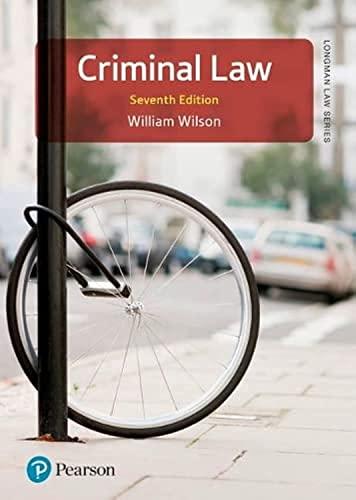Question
Part A Question 1: Even if the Regulations and the Order, apart from s. 92, are completely valid, they cannot be upheld if they are
Part A
Question 1:
Even if the Regulations and the Order, apart from s. 92, are completely valid, they cannot be upheld if they are inconsistent with s. 92. All the legislative powers given to the Commonwealth Parliament by s. 51 of the Constitution are given expressly "subject to this Constitution." The defence power is no exception. Section 92 is a provision which introduces into the substantive law of both Commonwealth and States a provision that trade, commerce and intercourse among the States shall be absolutely free. No statute or regulation or order made under a statute, whether by the Commonwealth or by a State, can repeal or modify this provision. It is a constitutional prohibition which is a limitation upon all legislative power. I refer to what I have said with respect to this matter in South Australia v. The Commonwealth (Uniform Taxation Case) and cf. Adelaide Company of Jehovah's Witnesses Inc. v. The Commonwealth, with reference to the prohibition of interfering with the free exercise of any religion contained in s. 116 of the Constitution. A provision in any law which is inconsistent with the freedom of trade, commerce and intercourse among the States which is protected by s. 92 must be held to be ineffectual and inoperative.
Latham CJ - Gratwick v Johnson (1943) 70 CLR 1, 13
In this case, how do the various judgments see liberty protected, if at all, through a written, federal constitution creating a Commonwealth government of limited powers?
Question 2:
Is the value of community a liberal value or is it in tension with individualism and equality?
Part B
Question 1
Leiboff and Thomas identify six characteristic ideas which form the core of liberalism. What are those six characteristics?
Question 2
Bottomley and Bronitt divide the rule of law requirements into three categories: formal legality, constitutional legality and procedural legality. List the rule of law requirements that come under each of these three headings.
Question 3
What is the underlying purpose of the rules set out in s 72 of the Constitution?
Question 4
Human rights are often described as innate, inalienable or universal. What is the source of human rights? Are they a species of natural law?
Question 5
Identify some examples of how economic efficiency can be used as a tool to evaluate legal rules.
Question 6
Carol Smart refers to 'the engulfing embrace of liberalism, which, in the form of law reform, has done so little to emancipate women.' Why does Smart see liberalism as antithetical to women's interests?
Question 7
Why did the colonial powers decide that Australia was terra nullius? What is the relationship between the law of nations in the 18th Century, and the doctrine of terra nullius?
Question 8
Recognition of Aboriginal law, and especially the use of violence, may contravene some of the core human rights principles. What are the competing human rights considerations at play?
Question 9
Identify the main features of the following legal systems:
a) Civil Law
b) Islamic Law
c) Chinese Law
Question 10
Explain the concept of the Rule of Law and provide a critique or defence from the following perspectives: (a) substantive equality; (b) gender; or (c) race.
Question 11
Kant's position on rights is often contrasted with utilitarianism. Explain both approaches. How might rights and utilitarianism converge?
Question 12
Can democracy exist without the rule of law? Explain.
Question 13
What is the difference between formal and substantive equality? Provide an example of both.
Question 14
Outline a possible feminist approach to justice. Provide an example.
Question 15
How did Aboriginal 'protection' legislation breach rule of law requirements and core liberal values?
Question 16
List the fundamental principles of Australian Indigenous law as defined by Irene Watson. Compare and contrast with the Australian legal system.
Question 17
Human rights are often described as innate, inalienable or universal. What is the source of human rights? Are they a species of natural law?
Question 18
How is globalisation relevant in a legal context?
Step by Step Solution
There are 3 Steps involved in it
Step: 1

Get Instant Access to Expert-Tailored Solutions
See step-by-step solutions with expert insights and AI powered tools for academic success
Step: 2

Step: 3

Ace Your Homework with AI
Get the answers you need in no time with our AI-driven, step-by-step assistance
Get Started


